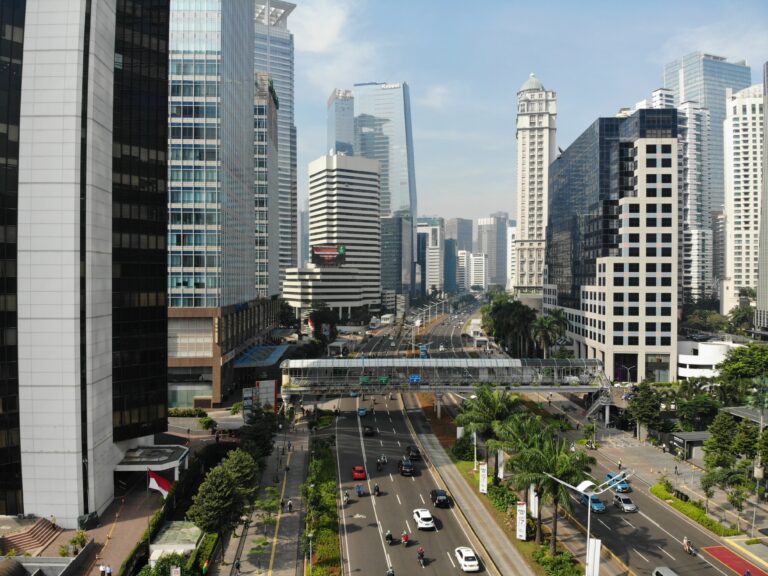Employer of Record in Indonesia

Discover the development opportunities in Indonesia, a rapidly growing region that is increasingly attracting international businesses! Are you considering expanding your presence in this dynamic market but apprehensive about the challenges it may bring?
Our team of experts is here to support you and provide comprehensive insights into wage portage in Indonesia. On this page, we share our key tips so that you can navigate this process successfully with peace of mind.
What is the Employer of Record service in Indonesia?
Wage portage and Employer of Record (EOR) services represent a growing trend in Indonesia, as businesses seek ways to streamline their human resources operations and reduce costs.
Wage portage is a type of outsourcing service where the third-party provider takes full legal responsibility for the workers. This means that the Employer of Record is accountable for all aspects of employment, from hiring and onboarding to termination. The original employer retains control over the day-to-day management of the workers.
What are the advantages of EOR in Indonesia?

Wage portage services provide a quick and adaptable solution designed to align with the goals and specific needs of your business.
The benefits are numerous:
Focus on core operations:
- Delegate administrative and regulatory tasks to our team.
- Channel focus towards the core activities of the business.
Strategic advantages for the company:
- Rapid establishment of a profitable local presence.
- Bypassing complexities associated with setting up and managing local legal frameworks.
- Elimination of extended waiting periods (which can extend up to 6 months) typically required for market testing.
Why choose Salveo as a partner in the EOR process?
Salveo is an Employer of Record offering a range of services to assist businesses of all sizes in managing their human resources in Indonesia.
Salveo’s services include:
- Drafting employment contracts in compliance with Indonesian labor laws
- Assisting in obtaining work and residence permits for foreign employees
- Processing payroll and issuing salary slips
- Administering social security and income tax
- Managing paid time off
- Reimbursement of professional expenses
- Handling contract terminations (non-renewal or dismissal)
- Liaising with the client company on all aspects of labor law and employment contracts
In addition to its core wage portage services, Salveo also offers a range of optional services such as recruitment, offices in its business centers, and international mobility management services (apartment search, school placement, car rental, etc.).
We can help you reduce your human resources costs, improve HR compliance, free up time and resources to focus on your core activities, and attract and retain the best talent.
If you are a company considering expansion in Indonesia or outsourcing your human resources, contact us!

The key elements to know before embarking on the EOR process in Indonesia.
Types of employment contracts in Indonesia
In Indonesia, there are two main types of labor contracts: fixed-term contracts (PKWT) and permanent contracts (PKWTT).
Types of contract | Probation period | Termination notice period | Severance |
Permanent contracts (PKWTT) | 3 months | 14 days (standard period)
| 1 month’s salary per year of service, up to 9 months’ salary maximum |
Types of contract | Probation period | Termination notice period | Severance |
Fixed-term contract (PKWT) | None | 14 days (standard period) | 1 month’s salary per year of service, up to 9 months’ salary maximum |
Common Probation Period Practice in Indonesia
While the probationary period is not mandatory for the Permanent contract (PKWTT), it is a prevalent practice if the employee and the employer signed a Fixed-term contract (PKWT). Usually spanning 3 months, this period allows for employee evaluation.
Working hours and overtime in Indonesia
The standard work week in Indonesia spans 40 hours, typically divided into 8 hours per day over 5 days or 7 hours per day across 6 days. Any work requested beyond these hours qualifies as overtime for employees and must be compensated. Overtime pay usually amounts to 1.5 times the base rate for the initial overtime hour and doubles to 2 times the base rate for subsequent hours. The maximum permissible overtime in Indonesia is three hours per day or 14 hours per week.
Written consent from the employee is mandatory for any agreement regarding overtime hours in Indonesia.
Annual paid leave
In Indonesia, employees are entitled to a minimum of 12 days of paid annual leave after one full year of employment. This leave is typically accrued at a rate of one day per month, and it can be taken in one or more installments. Employees who have been working for 6 consecutive years for the same employer are entitled to one month of paid annual leave in their seventh year of service and one month of paid annual leave in their eighth year of service.
National Holidays
The following table indicates the Indonesian Public holidays and their dates for 2024.
Holiday | Date |
New Year’s Day | 1st January |
Lunar New Year’s Day | From 22nd to 23rd January |
Ascension of the Prophet Muhammad (Tentative Date) | 18th February |
Bali’s Day of Silence and Hindu New Year (Nyepi) | From 11th to 12th March |
Good Friday | 29th March |
Idul Fitri Joint Holiday | From 21st to 23rd April |
Minimum wage
Minimum wages in Indonesia are determined by the central government. The provincial governments can also set higher minimum wages for their respective provinces. The national minimum wage for 2023 is Rp 4,641,854 (approximately $321) per month. The provincial minimum wages vary from province to province, with the highest being in Jakarta, at Rp 4,901,798 (approximately $338) per month.
Province | Minimum Monthly wage (Rp/month) |
Jakarta | 4,901,798 |
Banten | 2,661,280 |
West Java | 1,986,670 |
Special Region of Yogyakarta | 1,981,782 |
Central Java | 1,958,169.69 |
East Java | 1,950,000 |
Employment contract Termination
Employee dismissal in Indonesia is discouraged and often requires approval from the Labor Court. Employers can still terminate employment by providing written notice with reasons, but employees have the right to object and seek legal action.
The following table provides information related to the economic compensation following the termination of a labor contract:
Type of termination | Severance pay |
Termination by mutual agreement | One month’s salary for each year of service, up to a maximum of nine months’ salary |
Termination by employer for reasons of force majeure | 75% of basic severance pay |
Termination by an employer for economic reasons | 50% of basic severance pay |
Termination by employer for employee’s misconduct or poor performance | No severance pay |
If an employee agrees to a voluntary termination agreement, their consent is deemed valid. Additionally, Employers must report terminations to the local Manpower Office with standard documentation.
Receive your specialist study
+33 (0)1 84 79 17 50
09h - 18h UTC+1
22 Rue Georges Picquart75017 Paris
